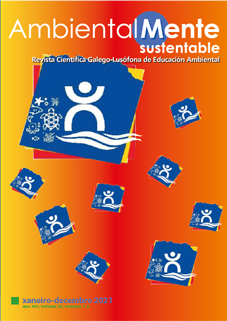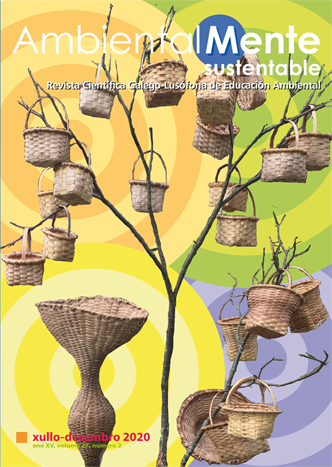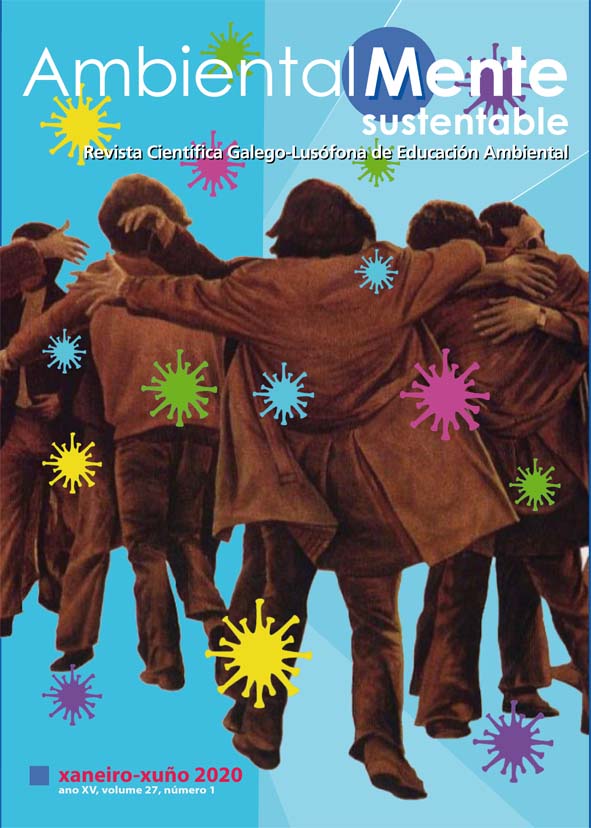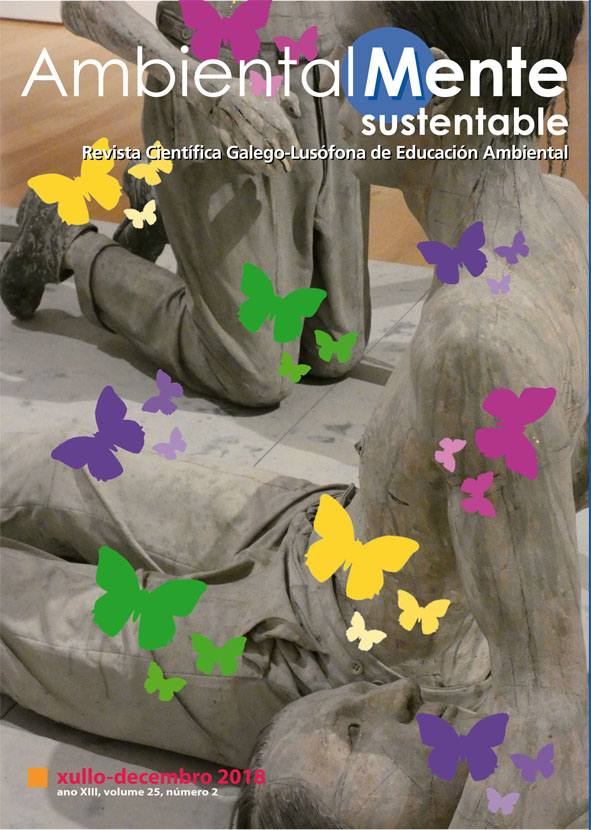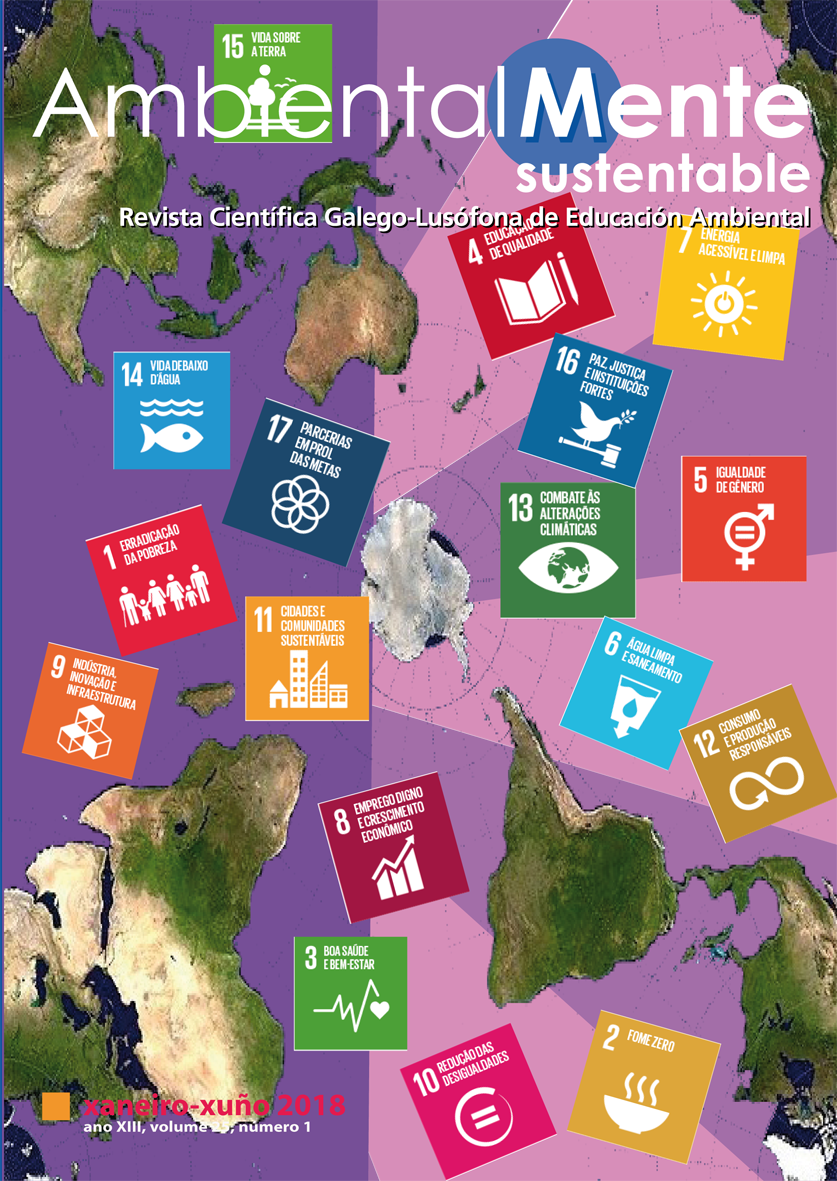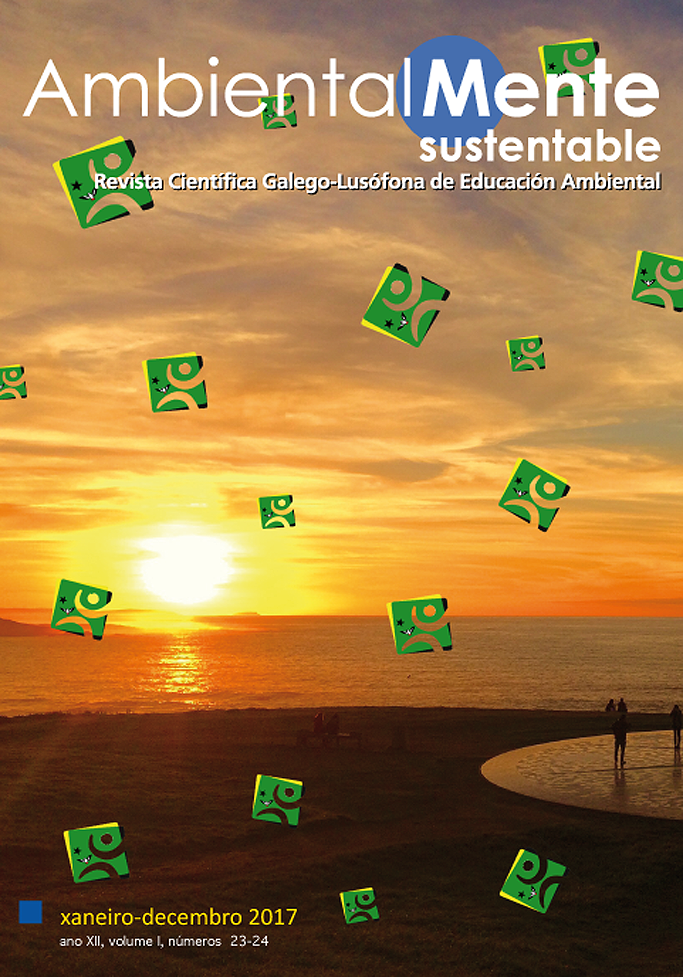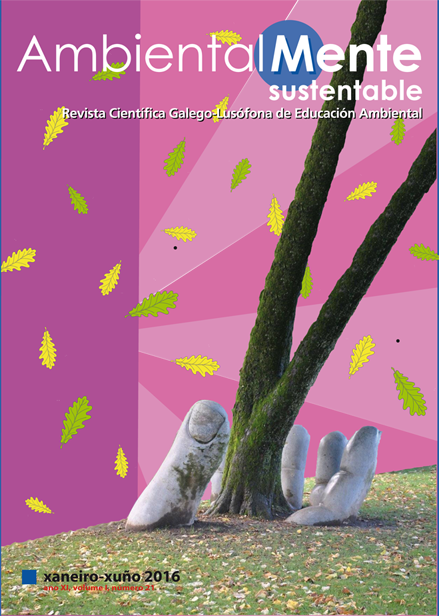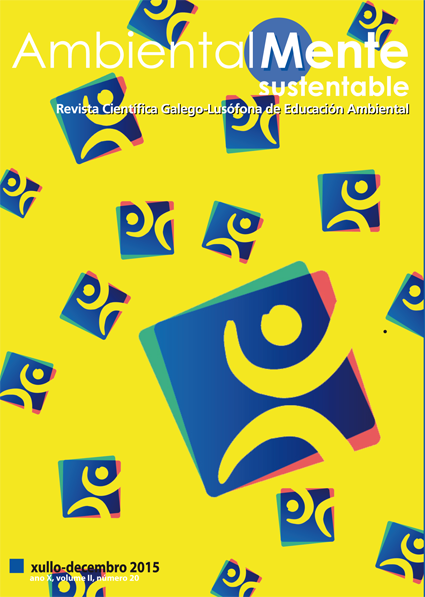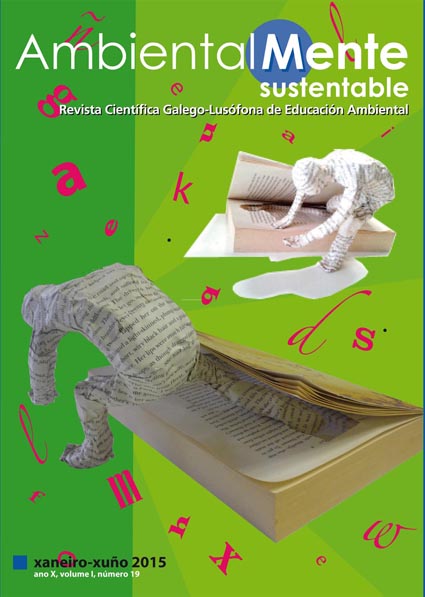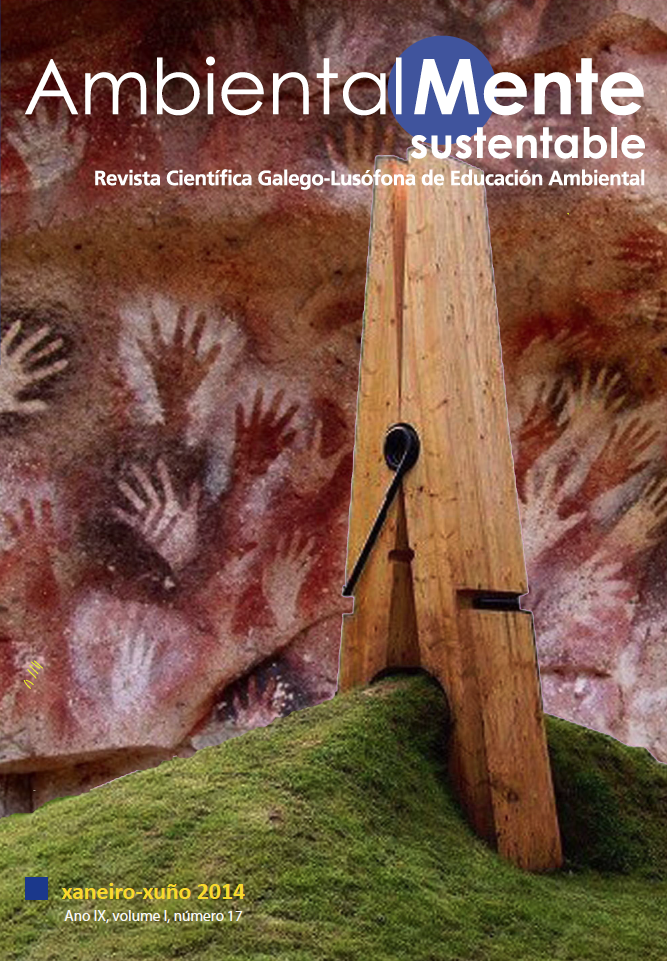Archives
-
Vol. 28 No. 1-2 (2021)
The Lusophone Network of Environmental Education (Redeluso) was founded in 2005, in Portugal, during the days of the Portuguese Association of Environmental Education (ASPEA). In 2006 some of its members met for the first time in person in Joinville (Brazil), during the V Iberoamerican Congress of Environmental Education. In this event, we decided to hold regular conferences, which had the following chronology:
2007 - Santiago de Compostela, Galicia
2013 - Cuiabá, MT, Brazil
2015 - Torreira, Murtosa, Portugal
2017 - Prince’s Island, São Tomé and Príncipe
2019 - Bijagos Archipelago, Guinea-Bissau
2021 - San Vicente Island, Cape VerdeThe program of the VI International Congress of Environmental Education of Portuguese-speaking Countries and Communities of continuity to the methodology of previous congresses, contributing to the formulation of public policies that help strengthen environmental education in the Portuguese-speaking countries and Galicia.
This space has specific objectives:
• Strengthen joint research, training and information processes in the field of Environmental Education, contributing to the debate on the future of the planet. This represents an invitation to participants to articulate their identities in the face of the challenges of Environmental Education in the Portuguese-speaking countries and Galicia;
• Improve scientific production in Portuguese, valuing the initiatives of periodicals and other means of dissemination on Environmental Education;
• Promote scientific communication on Environmental Education through educational communication, such as teaching materials and various digital systems, such as blogs, websites, school networks and discussion lists;
• To build a permanent learning process that favors the Lusophone identity in the philosophical structure of Environmental Education.The structure of the congress was idealized based on the suggestions and contributions resulting from the participatory process in REDELUSO. Below are some of the contributions made at this last conference.
-
Vol. 27 No. 2 (2020)
Environmental education has always been more or less linked to the formal educational systems of different countries; sometimes, recognized in the Education Laws, sometimes as a critical and committed practice on the part of teachers. The year 2020 has been the year of Covid-19, a global pandemic that has changed the everyday and hit people and countries with fewer resources more violently; this pandemic meant that students had to be confined to their homes and thus lose contact with their classmates, with the educational community, but also with their immediate environment.
From the collapse to hope, from simplistic perspectives to complexity, from voluntarism to social and institutional regulation, from problems to solutions, from classrooms to the immediate environment... Environmental education is once again a strategy for training and educational action towards committed societies , critical, supportive and fair.
Finally, we collect the manifesto presented on Earth Day, April 22, 2020, a call for planetary attention on the stage marked by Covid-19. -
Vol. 27 No. 1 (2020)
In the midst of the pandemic, this new issue comes to light and we wanted to have a look from Environmental Education to the current situation of ecological and health crisis; this time the gaze comes from Brazil. But we do not give up having a more multifaceted look and from a certain distance, so we want to close the year by dedicating a monograph to Covid-19 from the perspective of Environmental Education and Lusophone.
Past, present and future of Environmental Education includes several methodological proposals to know where we came from and propose where we are going. The second article is a history of Environmental Education in Catalonia seen from within, linked to the management, first of Protected Natural Spaces and in the last decade, from a more global, complex and interrelated perspective and without losing the national and international perspective: an interesting collection proposal to add local stories and make that common story. For the present and for the future we collect two contributions that understand Environmental Education as a political instrument for the change of today's society, for eco-social perspectives: an article from Brazil that is a methodological guide to promote change and an article from a Spanish cyberactivism movement that shows the immense possibilities offered by web 2.0 to act in a coordinated way.
Finally, the magazine collects experiences that show that another world is possible, through dissemination and social participation, through knowledge and commitment, through local involvement for global transformation.
-
Vol. 26 No. 1-2 (2019)
In 2007, the 1st International Congress of Environmental Education of the Portuguese and Galician Language Countries was held in Santiago de Compostela. Approximately 250 participants, from the eight Portuguese-speaking countries and Galicia, analyzed the state of the art of environmental education in each reality and revealed the interest in coordinating and joining efforts for an equitable, fair and sustainable development. Since then, this appointment has been repeated regularly: the 2nd Congress was in Brazil (2013), the 3rd in Portugal (2015), the 4th in São Tomé and Príncipe (2017) and the 5th Guinea Bissau (2019). This double issue of the magazine includes some of the contributions of this V Congress, which brought together participants on the topic "Ecological Crisis and Migration: readings and responses of Environmental Education."
We present the communications of axis 2 –Environmental Education in equipment, conservation and environmental management–, as well as the Bubaque Declaration and the Recommendations that from the V Congress are raised to the ministerial meetings of the CPLP.
AmbientalMENTE sustentable is born as a space for the dissemination of thought and educational-environmental proposals of the Portuguese-speaking and Galician world in our own languages. Visualizing and disseminating the contributions of these conferences is one of their reasons for being. Once again we thank the organization for taking us into account for the dissemination of progress in the field and the agreements signed. -
Vol. 25 No. 2 (2018)
The educational movement that relates social and environmental aspects to collaborate in the formation of a global, ecologically responsible and socially just citizenship, has been called Environmental Education.
The new international scenarios erase Environmental Education from the hegemonic discourse as a reference, and seek and create alternatives that are sometimes of dubious progress. The discourse of sustainability as weak as it is malleable fails to dethrone the already mature educational movement.
Environmental Education exists because there are groups that resist. Groups of teachers in schools, teachers and students in universities, politicians and politicians in local and national administrations, social organizations in municipalities, international organizations in debates... and many people in everyday life who demonstrate the need for an education committed to people and the environment, away from developmental models that undermine the possibilities for fair and equitable human development.
In this issue of ENVIRONMENTALLY sustainable we offer reflections, challenges and proposals to promote public policies of Environmental Education, committed practices and transformations from the local with a global perspective. Planet Earth deserves it, so do people. -
Vol. 25 No. 1 (2018)
The educational movement that relates social and environmental aspects to collaborate in the formation of a global, ecologically responsible and socially just citizenship, has been referred to as Environmental Education.
The new international scenarios erase the hegemonic discourse of Environmental Education as a reference, and seek alternatives and create uncertain advances.
The speech of sustainability as weak as malleable does not manage to dethrone the already mature educational movement. Environmental Education exists because there are groups that resist. Groups of teachers and teachers in schools, teachers and students at universities, politicians and politicians in local and national administrations, social organizations in municipalities, international organizations in debates... and many people in the day to day demonstrate the need for education committed to People and the environment, far from developmental models that undermine the possibilities of a just and equitable human development.
In this ambientalMENTE sustentable number we offer reflections, challenges and proposals to promote public policies of Environmental Education, committed practices and transformations from the local with a global perspective. The Terra Planet deserves, people too. -
Vol. 23-24 No. 1 (2017)
The Lusophone Environmental Education Network (Redeluso) was founded in 2005, in Portugal, during the days of the Portuguese Environmental Education Association (ASPEA). In 2006, some of its members met for the first time in person in Joinville, Brazil, during the V Ibero-American Congress on Environmental Education. In this event, we decided to hold periodic congresses, which had the chronology:
2007 - Santiago de Compostela, Galicia
2013 - Cuiabá, MT, Brazil
2015 - Torreira, Murtosa, Portugal
2017 - Príncipe Island, São Tomé and Príncipe
At all events, we made efforts to have the presence of participants from the eight Portuguese-speaking countries: Angola, Brazil, Cape Verde, Guinea Bissau, Mozambique, Portugal, São Tomé and Príncipe and East Timor. In addition, we try to guarantee Portuguese-speaking locations, such as Galicia or Hong Kong.
The next event is planned to take place in Guinea Bissau, in the year 2019. Our hope was to bring together people with a similar idiomatic identity, capable of feeling, thinking and doing environmental education in our own languages, ways, habits and culture. We recognize that identity is not fixed, it is changing as our culture becomes more dynamic, and it is not confined to grammatical or orthographic rules, but to a mosaic of networks and threads in the fabric of new organizations and ethnographic rearrangements.
So is the proposal of the magazine AmbientalMente Sustentable (AMS), which has Araceli Serantes-Pazos and Carlos Vales-Vázquez as chief editors very talented in creating and maintaining the magazine. Adding many experiences and becoming a world reference in the field of environmental education, AMS opened its doors to receive the records of knowledge produced during the IV International Congress on Environmental Education of Portuguese-speaking countries and communities, which took place in 2017, on Príncipe Island, in São Tomé and Príncipe. Thus, this special issue counts on the ad hoc Committee of Consultants of the Federal University of Mato Grosso. -
Vol. 02 No. 022 (2016)
The current challenge of environmental education is to promote the real involvement of citizens with the future of the Planet. A commitment that goes through the change of the development model of many, many citizens. It is necessary to ensure the conservation of spaces, species and cultures that are being attacked, causing their deterioration and even their disappearance. Commitment that must emerge from the place to become a global practice, a glocal environmental education.
The articles in this issue share a dialogical ethical position, based on participation and co-responsibility in different scenarios: in Protected Natural Spaces, Universities, companies ... Once again, the presentation of experiences and case analysis provide methodological proposals for work, new routes and many possibilities of partnerships, to continue working together and together.
In this new issue of ENVIRONMENTALLY SUSTAINABLE we have changed some aspects of the magazine layout plus the philosophy of the magazine remains the same. Thank you (thank you) for your interest and collaboration. -
Vol. 01 No. 021 (2016)
The current challenge of environmental education is the real involvement of citizens with the future of the planet. A commitment that involves changing the life model of many citizens. But it is also necessary to ensure the conservation of spaces, species and cultures that are attacked, causing their deterioration and disappearance. Commitment that must emerge from the local to become a global practice.
The articles in this issue share the ethics of partition and co-responsibility in different areas: in protected natural spaces, in universities, in companies... Once again, the presentation of experiences and the analysis of cases provide methodologies of work, routes and possibilities of partnering to continue working together. In this new issue of ambientalMENTE sustentable we changed some aspects of the layout of the magazine, but its philosophy remains the same. Thank you for your interest and collaboration. -
Vol. 02 No. 020 (2015)
ambientalMENTE sustentable é unha revista científica que xurde no ano 2007 co motivo do 1º Congreso Internacional de Educación Ambiental dos Países Lusófonos e Galicia; este número ten un carácter especial por doble motivo: porque celebramos os 10 anos da revista e porque recolle as comunicacións presentadas no 3º Congresso Internacional de Educación Ambiental dos Países Lusófonos.
Por tratarse dun número especial, a estrutura de revista tamén muda, pasando a ter oito apartados temáticos que responden aos oito eixos temáticos do Congreso. O tema que congrega a educadoras e educadores, persoal investigador, persoal de xestión e do ámbito políticos é a participación social na procura do ben común.
A continuación preséntanse moitas das 239 comunicacións que foron presentadas e debatidas en Torreia-Murtosa (Portugal) no mes de xullo do 2015. A maior parte do artigos son de corte investigador, contribuíndo a fornecer a disciplina cun ollar propio; tamén son numerosos os artigos de reflexión sobre experiencias desenvolvidas e promovidas por diferentes axentes (ONG, asociacións, organizacións públicas e outros organismos), dos que merecen un especial destaque aqueles desenvolvidos no ámbito escolar.
Agradecemos á organización do Congreso a oportunidade de ser o medio de divulgación das reflexións, investigacións e experiencias que se están a desenvolver no contexto actual da lusofonía. -
Vol. 01 No. 019 (2015)
Environmental education is not present on the political agendas of many countries.At this time, in which environmental problems seem not to have limits and their gravity is scary, many public administrations and private entities divert their attention, inhibiting themselves from their responsibility towards society.
This issue of the magazine collects a series of action proposals in different settings: from political participation, to the training of teachers in Universities, agents and guide-interpreters within the framework of the European Union, even in such specific spaces as the Environmental Interpretation Centers.
We also present a text proposal for the 2030 Agenda proposed by the United Nations, Transforming Our World: The 2030 Agenda for Sustainable Development, that wants to mark an Action Plan through the global objectives. This Agenda contains 17 Sustainable Development Goals and 169 goals to be achieved by 2030.
Once again, environmentally sustainable wants to be that space for reflection and exchange with the intention of promoting a more equitable Planet and committed to life. -
Vol. 02 No. 018 (2014)
Un dos retos ambientais da sociedade actual é a conservación do noso Patrimonio, entendindo na súa acepción máis ampla: patrimonio natural e cultural, material e inmaterial, tanxible e intanxible. Os modelos de desenvolvemento da maior parte dos países poñen en risco moitas das veces ese Patrimonio común, base das distintas culturas e de moitos dos ecosistemas dos que depende a vida no Planeta Terra.
A Educación Ambiental como disciplina ten tamén como reto abordar desde a educación e a comunicación o problema da conservación do Patrimonio. Neste caso os instrumentos cos que conta son de tipo didáctico e comunicativo, baseados na participación e no compromiso, máis tamén na reflexión crítica e na acción directa.
Neste número da revista ambientalMENTE sustentable recóllense aportacións de distintas autoras e autores, centradas en temas diversos, que van da análise da comunicación sobre o cambio climático, até a comunicación de patrimonio tanxible e intanxible desde os Museos até as crenzas dos grupos sociais e como estas determinan as súas prácticas en contextos concretos, neste caso na Amazonía. ë interesante comprobar os puntos de encontro e sinarxias entre a “nova museoloxía” e a educación ambiental, na súa visión de empoderar á cidadanía na conservación dos valores patrimoniais.
Este número recolle traballos cun marcado carácter práctico, baseado na investigación sobre casos reais, cuxas aportacións, debates e conclusións, consideramos, son un bo punto de partida para seguir avanzando, tanto na disciplina como no reto da conservación do noso Patrimonio.
-
Vol. 01 No. 017 (2014)
A Educación Ambiental é un ámbito profesional que en moitos países iberoamericanos e lusófonos está sen regular, polo que en moitos deles comezaron a despuntar movementos de cara á profesionalización do sector. A formación a xogado un papel fundamental, por unha banda, porque facilitou a adquisición de coñecementos e técnicas, e por outras banda porque otorgou titulacións e credenciais a un importante número de profeionais que agora reivindican normalizar a súa situación.
Neste número algúns autores realizan aportacións arredor da formación dos profesionais en distintos contextos e realidades, e outros mostran espazos de especialización e acción da Educación Ambiental.
Por outra banda, adiántase un artigo sobre un estudo de como está a afectar a crise económica no sector da Educación Ambiental. Un análise e reflexión tan oportuno como necesario.
Desde o Consello de Dirección entendemos que este número non pecha nin aborda o tema na súa totalidade, polo que o entendemos como un convite para seguir profundizando e avanzado nestas cuestións. -
Vol. 01 No. 015-016 (2013)
Que é primeiro, a teoría ou a práctica? Esta pregunta resume un debate eterno sobre as concepcións da ciencia, os métodos, a adquisición de coñecementos e os modelos de aprendizaxe. As teorías persiguen descubrir aqueles rasgos capaces de explicar como se aprende e predecir os efectos das prácticas. As prácticas, moitas veces rutinarias, están determinadas pola tradición, a autoridade e as teorías maioritarias, mais esta práctica irreflexiva chega a constituirse como a fonte de coñecemento profesional.
-
Vol. 01 No. 013-014 (2012)
A educación ambiental, como disciplina e como ámbito de intervención educativa, precisa revisar a súa práctica e fomentar a investigación para seguir avanzando.
No presente número da revista recóllense algunhas aportacións neste sentido, de cara a manter certas prácticas que desde o ámbito académico e científico desde a avaliación e a investigación considéranse valiosas e oportunas, e de presentar outras máis anovadoras que
permiten seguir abrindo novas vías de cara a enfrontarnos aos problemas ambientais desde a educación e a comunicación. -
Vol. 01 No. 011-012 (2011)
Turismo, conservación e educación ambiental
-
Vol. 01 No. 09-010 (2010)
Traballo en rede desde a educación ambiental
Este duplo número da revista é un monográfico sobre o traballo en rede desde a educación ambiental. Nel se recollen aportacións teóricas sobre o sentido profundo da sustentabilidade ambiental, traxectorias de traballo e boas prácticas nas que se evidencia a interconexión entre investigación e acción, ou o traballo en rede de iniciativas como a Conferencia Internacional Infantoxuvenil en Brasilia ou o Proxecto Fenix, a través do cal os galegos e galegas poideron participar na avaliación da Estratexia Galega de Educación Ambiental. Por último, presentanse experiencias en rede en tres continentes, con distintas metodoloxías, temáticas, obxectivos e actores: experiencias desde México, desde Cabo Verde e San Tomé e Príncipe, e desde o estado español.
-
Vol. 02 No. 08 (2009)
Novas visións da educación ambiental, novas propostas
Este número recolle novas miradas e reflexións sobre o ámbito da educación ambiental cun sesgo máis histórico e de recapitulación sobre o moito xa feito. O número 8 da revista presenta interesantes achegas que reelaboran a historia desta disciplina xa non tan nova: desde a análise contemporánea se fai unha lectura do que ten acontecido para vislumbrar os posibles camiños de cara a acción.
-
Vol. 01 No. 07 (2009)
Estratexias de comunicación e educación ambiental frente ao cambio climático
O presente número é un monográfico que recolle moitas das aportacións realizadas dende o Seminario "Comunicación, Educación e Participación fronte ao Cambio Climático" que, con periodicidade anual, vense celebrando coordinado polo CENEAM e co auspicio do Ministerio de Medio Ambiente e Medio Rural e Marino a través do Organismo Autónomo Parques Nacionais.
Nel se recompilan estudos que se están a facer sobre a perspectiva social e a ameaza que supón o cambio climático, poñendo especial fincapé nos problemas da comunicación. Tamén preséntanse algunhas formas innovadoras e exitosas de comunicación e de participación, xunto a unha serie de traballos de investigación e experiencias que poden servir como marco de reflexión e acción.
-
Vol. 02 No. 06 (2008)
Usos socioeducativos dos parques periurbanos, xardíns botánicos e outras áreas forestais
Este novo número é un monográfico sobre os usos de muitos dos espazos forestais que teñen un necesario uso social, científico e educativo: os parques periurbanos, xardíns botánicos e áreas forestais. Estes lugares están a funcionar, non só como pulmóns verdes e para o lecer, si non tamén como lugares para construir ciencia e cidadanía democrática, espazos vivos para a divulgación científica, a investigación e a sensibilización. A maior parte dos artigos corresponden ás ponencias presentadas no Seminario Internacional "Usos sociais e parques forestais, xardíns botánicos e outras áreas forestais", organizado polo CEIDA durante o mes de abril de 2008.
-
Vol. 01 No. 05 (2008)
A educación ambiental no sistema educativo formal
A educación ambiental nace fortemente vinculada aos sistemas educativos das distintas nacións; os procesos de institucionalización, dinamizados a nivel internacional fundamentalmente pola UNESCO, o fixeron así posible. Mais cada Estado asumiu de forma diferenciada o seu compromiso educativo repecto ás relacións que deben manter as persoas co medio ambiente.
Neste quinto número, a revista AmbientalMente Sustentable presenta reflexións teóricas, experiencias de investigación e de participación, así como estratexias de acción e recursos para seguir traballando dede o ámbito da educación formal.
-
Vol. 02 No. 04 (2007)
Instrumentos sociais e conservación de especies
A Comisión Española de Educación e Comunicación da UICN, en colaboración co CEIDA, realizou en setembro de 2007 un seminario sobre os instrumentos sociais na conservación de especies. Neste número da revista, de carácter monográfico, preséntanse estudos de caso e accións para mellorar, a través dos distintos intrumentos sociais (comunicación, educación, participación e sensibilización), a conservación da fauna.
-
Vol. 01 No. 03 (2007)
Cuestións de fondo na educación ambiental
Ante a problemática ambiental, os modelos inxustos de desenvolvemento e as prácticas insostibles de xestión do medio, a educación ambiental preséntase como un necesario instrumento de intervención social, que axuda a definir novos actores e de "resignificar" o mundo. Unha vez máis, este novo número pretende divulgar os esforzos de investigación, análise e reflexións que se están a facer no ámbito educativo, tendo como escenario o mundo lusófono e Galicia, máis coa necesaria perspectiva de recibir aportacións desde outras realidades.
-
Vol. 01 No. 01-02 (2006)
Un ollar estratéxico á educación ambiental
AmbientalMENTEsustentable xurde como resposta a unha necesidade sentida, son moitas as personas que dende os países latioamericanos ou desde os países lusófonos están a facer investigacións e reflexións de carácter científico no ámbito da educación ambiental, máis que non atopan un espazo de comunicación científica na súa lingua.
Este primeiro volume recolle moitas das aportacións elaboradas polas persoas que participaron como poñentes no Seminario Internacional de Perfeccionamento da Educación Ambiental, celebrado no CEIDA en novembro de 2006.

